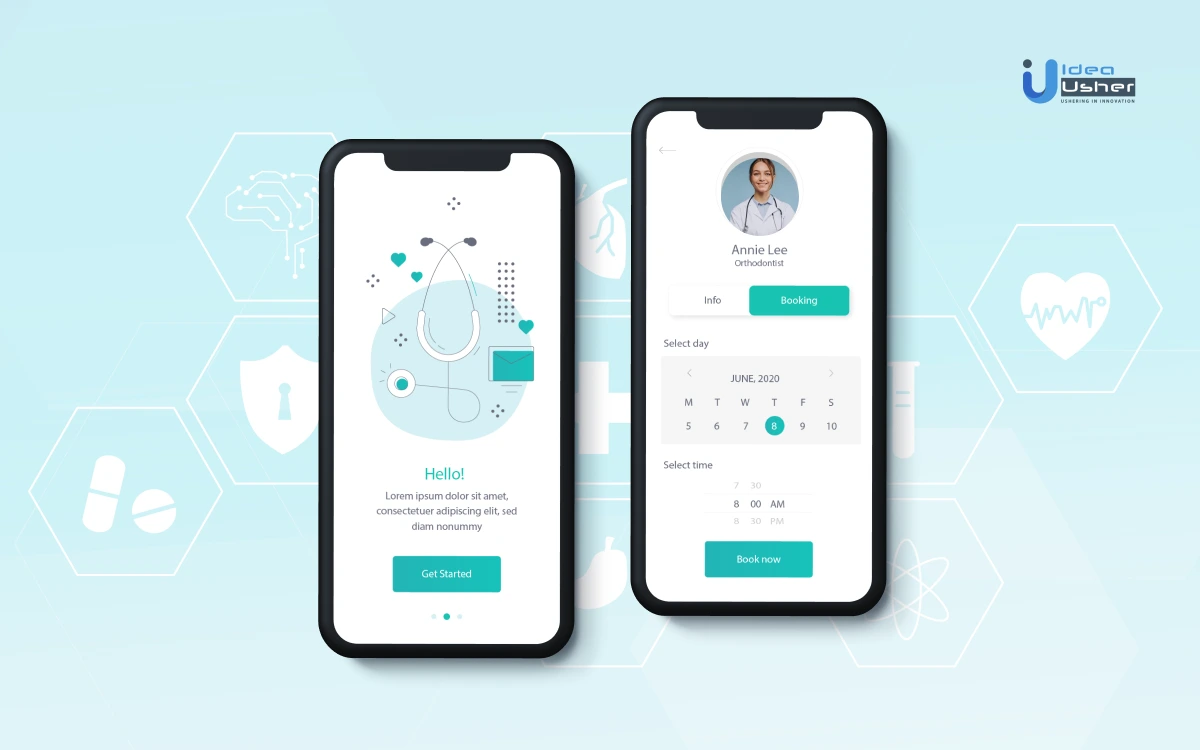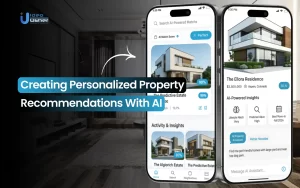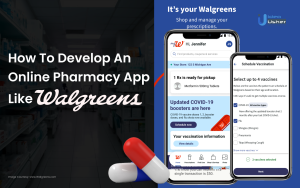The hard time in 2020 has impacted not only our lives but also the healthcare app market.
According to the report of CB Insight, there is a 300% increase in investment in every aspect of the healthcare industry, including health education services, remote patient monitoring, consultations, etc.
As the number of app users is growing, it becomes crucial for businesses to have their own mobile apps to stay competitive in the market. Thus, if you’ve been debating whether to develop your healthcare app, the right moment is now.
Also, the market of the fitness industry is growing tremendously, indicating a better investment opportunity for businesses and entrepreneurs by developing an app.
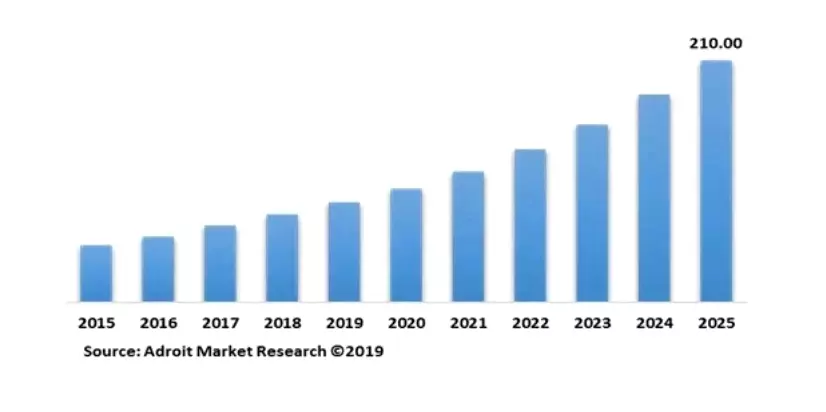
Source: adroitmarketresearch.com
As per the report, it is estimated that the healthcare industry will reach $780 B by 2030 at a CAGR of 16%.
Creating medical applications requires deeply analyzing ideas, development steps, and trends.
You can proceed with this article to know the exact steps to create your mobile application along with the needed compliances, monetization models, and getting a list of the best apps for taking ideas and inspiration.
What is a healthcare app?
Mobile healthcare app is a collection of various applications with different uses, such as tracking health data, ensuring remote assistance, virtual doctor consulting, etc. The purpose of apps depends on the app category based on your needs.
It is essential to understand an ideal category for your app to target the right market niche and audience. Before handling your project with app developers, understand the app types in this industry to pick the right one for your business.
Professional healthcare apps
These apps involve communication and treatment processes between patients and doctors.
Consider DrChrono and Locus Clinician as the best examples.
The list of professional app types is as follows:
- Doctor appointment apps;
- Electronic medical/health records apps;
- Medical reference apps;
- Database apps;
- Health tracking apps;
- Networking apps (for doctors);
- Telemedicine apps.
Healthcare apps for patients
Apps under this category don’t need the involvement of doctors. These apps normally provide a lot of helpful information for patients. BetterMe andLifesum is the best examples under this category.
There are different app types under this category, such as:
- Medical education apps
- Reminder apps
- Healthy lifestyle apps
- Dieting apps
- Diagnosis apps for preventive purposes
- Fitness apps
Best startup ideas for healthcare apps
To start a successful business in the medical industry, it’s essential to keep up with the latest trends and changes in the field. By staying informed, you can better position your startup for success and growth.
The best ideas are as follows:
1. Appointment app
The apps allow patients to find the right doctor and take the best consultation possible.
Moreover, these apps allow patients and doctors to manage appointments to proceed with the best timing for online consultation possible.
2. Reminder app
There is a straightforward goal of these apps, which is to remind people to take drugs on time. You can use this app as an excellent feature by adding this to your app. Reminder apps can help you offer a better patient experience when taking medications on time.
3. Fitness app
Fitness apps help users to monitor their health, such as tracking steps, burning calories, heart rate, calorie consumption, exercise, etc.
The use of fitness has grown tremendously. In 2020, the number of mHealth app users was around 62.7 million, which will jump to 87.4 million by 2022.
However, to increase the potential of the functionality of your fitness app even further, we recommend you integrate your app with wearables such as smartwatches and other gadgets that are used in tracking health.
Benefits of healthcare apps for doctors and patients
The primary reason for the high demand for medical app development is it fulfills the major needs of both patients and doctors.
However, apps offer many benefits to doctors and patients, the major of which have been discussed below.
A. Benefits for doctors:
The app benefits for doctors are as follows.
I. Remote assistance
Mobile apps help doctors to provide consultation to their patients by monitoring their health, even when they are far away. Also, doctors can save time by avoiding visiting their patients’ addresses and contacting them through in-app video calls or chatting-based features.
II. Effective workload distribution
Doctors can set up appointments at their suitable time with the help of health apps. Moreover, this helps doctors to manage their essential tasks, such as providing prescriptions, keeping a record of their patient’s data, etc.
III. Brand awareness
Doctors can use mobile apps to boost their business profits by improving the brand awareness of their clinics and hospitals. Plus, having mobile apps can help doctors to Increase loyalty and trust among their patients.
Doctors offering their exclusive mobile apps have better chances that their patients will choose them again next time because of having a great experience with their mobile apps.
B. Benefits for patients:
The app benefits for patients are as follows.
I. Improved treatment process & cost efficiency
With the help of a mobile app, patients can easily access consultations from their doctors.
On the other hand, doctors can easily examine their patients properly with the help of available features such as video calls and document viewing features to read the health reports and lab tests of their patients.
Moreover, for patients, mobile medical apps cost less than personal appointments for booking appointments with their doctors.
II. Online payment
Users can avoid the hassle of paying in cash simply through a mobile app’s digital payment feature, which offers a fast, convenient, and more accessible option.
III. Remote assistance
Remote assistants help patients to save time by accessing virtual appointments with their doctors. Accessing virtual consultation is fast and takes less time than visiting the doctor’s address.
By knowing the development steps, you can quickly build and launch your app in your targeted industry. Know the app development steps in detail.
How to make a healthcare app?
Starting mobile app development is not a straightforward process. Many involved factors are essential to consider when developing an app.
Here’s a list of detailed steps that will simplify creating your medical app development.
Step 1 – Do market research
You can only ensure the success of your app if it brings value to the life of your audience.
Therefore, it becomes crucial for you to do market research in this industry to find out the required app development steps, legality requirements, pain points of your audience, and strength of your competitors involved in this business, especially with their mobile apps.
Performing market research will enable you to find out the unique ways by which you can stand out from the rest of the competition and attract your target audience to your digital platform.
Step 2 – Study your audience
Communicating with your ideal audience is the right way to know about their pain points and challenges you can solve with your app.
While creating applications, you must be prepared to deal with the sensitive topics that individuals may have.
You can find their challenges and pain points by conducting interviews and surveys. We recommend you ask about methodology, not personal issues, during interviews.
For example, you can ask your target audience, “What is your eating schedule?” instead of “Do you feel bad when your friends comment on your weight”?
Here are a few tips for conducting the interview.
- Explain the goal of your interview to your audience
- Guide the person whom you are interviewing
- Avoid asking very personal questions, especially regarding their health & body, to avoid making them uncomfortable.
Without knowing the pain points and challenges of your audience, it is almost impossible to create an app that can bring value to their lives.
However, partnering with an app development agency can help you with market research, and it will be helpful for you to know your audience.
Step 3 – Choose the app type
Several things, such as functionality, app goal, and database, determine the type of app. It becomes essential for you to be clear about what kind of app you need for your business.
We recommend you choose from the following app types that are performing well in the market:
Apps for patients
- Fitness and wellness apps
- Telemedicine apps
- Mental health apps
- Symptom checkers
- Appointment scheduling applications
- Medication intake tracking apps
- Appointment scheduling applications
Apps for medical professionals
- Remote patient monitoring apps
- EHR data aggregation and analysis apps
- Practice management apps
- Medical research apps
Apps for healthcare providers
- Clinical assistance apps
- Timetable scheduling apps
- Billing apps
- Electronic health record (EHR) systems
- Population health management software
- Medical device data collection platforms
- Wearable tech apps
- Drug inventory tracking apps
Step 4 – Hire app developers
App development is a complex process that requires skills and expertise in programming. Therefore, to create your app, you may need to hire app developers for your project.
App developers will help you with creating an app from scratch by following step by step process such as:
- Idea validation
- App Strategy
- Front end development
- Back end development
- API integration
- App testing
- Launching your app
- Upgrading and maintaining your app
The recommended option is to outsource your project to an app development company with expertise in creating apps, especially for the health & wellness industry.
To select the best app development agency for outsourcing, you can check the portfolios of their past published medical and fitness apps.
Step 5 – Select tech stack
Careful selection of the right tech stack is essential for app development. However, partnering with a good app development agency can help you select the suitable tech stack for your project.
You can consider the following for your medical app development.
| Android | Java, Kotlin, Android Studio, Jetpack Compose, Android UI (template) |
| iOS | Objective-C, Swift, XCode, AppCode, UIKit, SwiftUI |
| Cross-platform | React Native(JS), Flutter(Dart), Xamarin(C#) |
| Server | Amazon EC2, Amazon EKS / AWS Lambda |
| Storage | Amazon S3 |
| Database provider | Amazon RDS, Amazon DynamoDB |
| Messaging queues | Amazon SQS |
| Push notifications | Firebase notifications |
| API server | Node.JS |
Step 6 – Build MVP
MVP is the basic version of mobile apps containing only the list of selected features to make your app fully functional. MVP enables developers to create an app in a fast and economical way.
When creating an app for your business, you can go for only a few selected features to make it ready to launch and make modifications based on your users’ feedback.
MVP will give you a competitive advantage cause you will be able to enter the market faster and start gathering feedback from your actual users with less app development cost.
The feature checklist for the MVP of your app is as follows:
I. For doctors
- Doctor’s profiles
- Chat
- Calendar
- Notifications
- Alarms
- Patients’ health card
II. For patients
- Patience profiles
- Chats
- Calendar
- Notifications
- Surveys
- Alerts
Make your business more trustable and user-friendly by knowing and implementing the required compliances for medical application development.
Required medical compliance for healthcare apps
The needed compliances are as follows:
1. HIPAA
The compliance ensures that all patient and associated party information, such as hospitals and physicians, is secure on applications.
2. FDA
Applications that focus on giving educational material, video games to inspire patients, using GPS location, recording doctor-patient talks, or using patients’ information such as gender, gender, and behavior to offer counseling, etc., are all FDA compliant.
3. BYOD
BYOD involves successfully implementing the MDM (Mobile Device Management) strategy. The strategy assists organizations in controlling PHI(Protected Health Information) in a secure real-time environment.
4. GDPR
GDPR rules ask for special protection of sensitive information. While creating apps, ensure that the data of every patient and provider your application would store is highly secure.
5. HL7
The set of global standards for sharing, integrating, exchanging, and retrieving information as governed by Health Level 7 organization.
Knowing top medical apps can give you an idea about the features and services you can offer through your app.
Also, you can get an idea about the best monetization strategy for your app by checking out top apps in the medical industry.
Top 5 most popular healthcare applications
The following apps are the best examples:
1. Generis
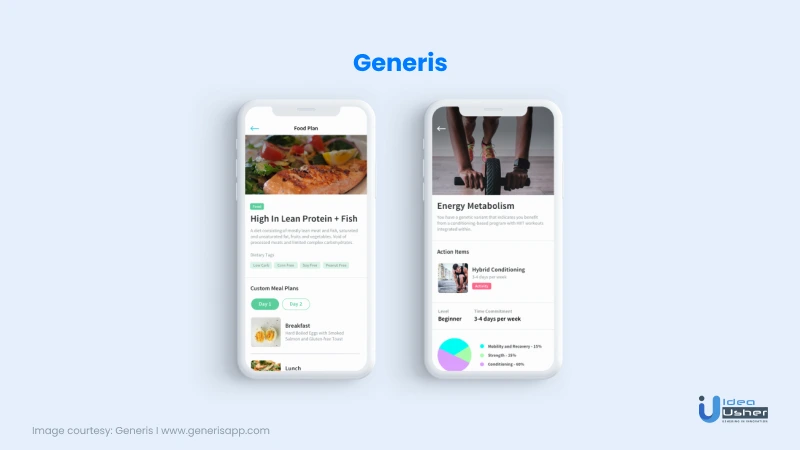
This software enables users to enhance their lives by learning about their DNA. It provides health recommendations based on the DNA of its users. Generis even provides information about diet, nutrition, the finest supplements, etc.
Best for
- DNA-based suggestions
- Recommendations for food and nutrition
- Exercise instructions
- Supplements that are recommended
- Goals for health and fitness
| Available platforms | iOS |
| Ratings | 4.4 |
| Price | Lifetime purchase of $19.99 |
| Services offered | DNA-based health recommendations and fitness goals |
2. Better Help
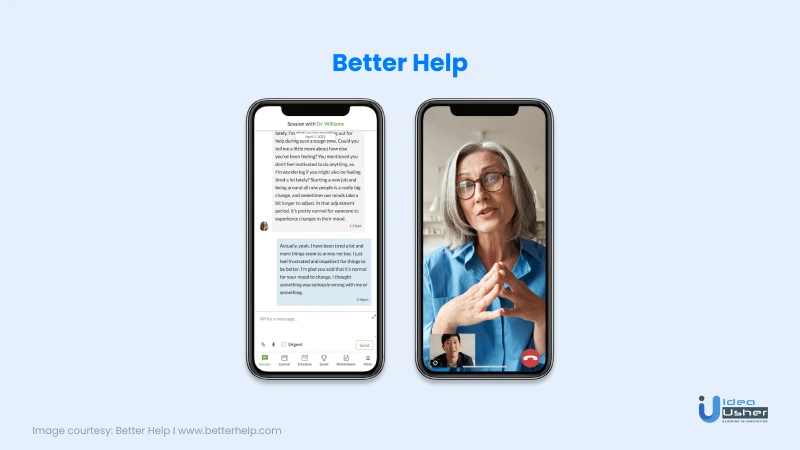
This app provides users with instant access to mental health specialists. Almost 3000 qualified therapists and counselors are available online.
The app offers treatment for everything from depression to anxiety problems, with an additional option for group webinars.
Better help offers a monthly membership with unrestricted access to therapist communication and weekly live sessions.
Best for
- Group therapy
- Scheduled live chats
- Calling from an unknown number
- Live video conferences
| Available platforms | Android & iOS |
| Ratings | Android: 4.7 iOS: 4.8 |
| Price | Subscription of $90 per month |
| Services offered | Psychology treatments |
3. Teladoc
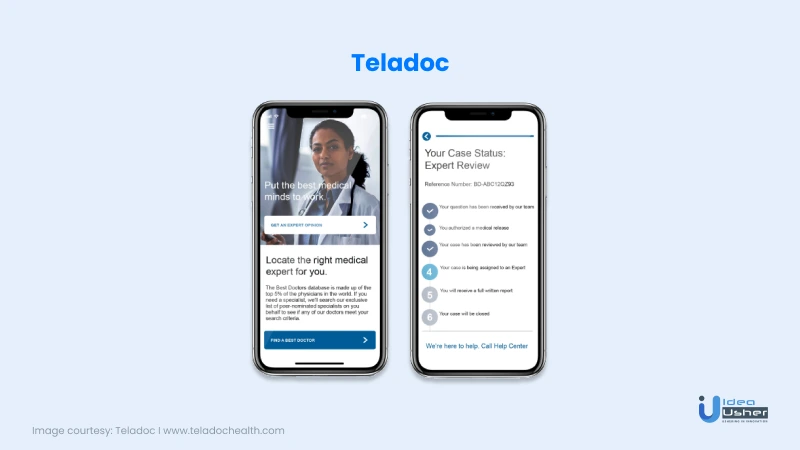
Patients can connect with the most qualified doctors accessible using the “Teladoc” app. Based on the conditions they are suffering from, doctors recommend patients on the right medications and security precautions.
Also, this app integrates with Apple Healthkit to enhance the user experience. Users can upload the app with the most recent health information.
Best for
- Skincare
- Nutrition guidance
- Routine checkups
- Diabetes treatments
- Stress & depression treatments
- Weight loss
- Creating fitness goals
| Available platforms | Android & iOS |
| Ratings | Android: 4.3 iOS: 2.9 |
| Price | $75 per visit |
| Services offered | Appointments, Nutrition tracking |
4. MySugr
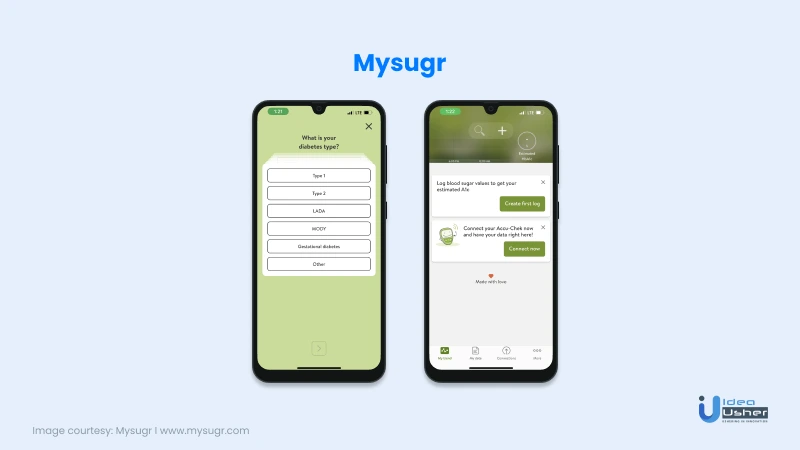
Patients can check their blood sugar, carbs, and other diabetes factors with MySugr. The app also provides motivating challenges for their app users to tackle Type 1 and type 2 diabetes within the app.
Best for
- Diabetes calculator
- Wearable connectivity
- Fully detailed diabetes reports
- Fitness challenges
- Accessing blood sugar levels with ease
- Sharing blood test results with physicians
| Available platforms | Android & iOS |
| Ratings | Android: 4.8 iOS: 4.8 |
| Price | $2.99 per month |
| Services offered | Diabetes & Insulin related treatments |
5. Eye care live
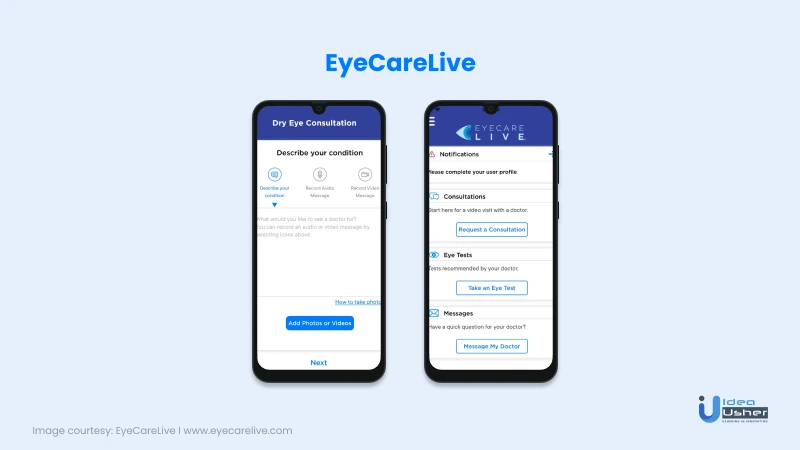
The app offers the easiest way to interact with eye doctors for minor issues, including dry eyes, red eyes, allergies, and other less severe eye problems.
Through video calls, the doctor in this app analyses the patient’s eye condition before recommending the most appropriate treatment.
Best for
- Vision care
- Dry eye treatment
- Red-eye treatment
- Buying contact lenses
| Available platforms | iOS |
| Ratings | 4.4 |
| Price | $49 per visit |
| Services offered | Eyecare treatments |
But how do fitness and medical apps make money? Know in detail.
How do healthcare apps make money?
These are the most common ways how medical apps make money
1. Subscription model
The subscription model is one of the most common revenue models for the fitness and medical industry. The businesses can charge their users based on annual or monthly subscription models to allow them to access services.
2. Advertisement model
Businesses can showcase the advertisements of their other brands on their app and can make money based on the number of ads displayed, total ad clicks, or based on other criteria.
However, make sure to avoid showing too many ads on your app as it may distract your audience and can hinder the usability of your app.
3. Referrals
Reference is another source of income. However, this model does not provide immediate income. Still, it is profitable in the long run. You can earn money by referring each new user, whether a patient or doctor, to your partnered medical app.
4. Sponsorships
Instead of advertising, you may use your app to promote the products and services of other businesses and clinics. You can be paid a commission on each sale made through your app, depending on the types of products and services you promote.
Conclusion
In general, healthcare applications can be divided into two parts: professional apps, where doctor involvement is essential, and apps for patients, where the involvement of doctors is optional.
When doing market research, interview your potential customer by considering methodology for asking questions on sensitive topics.
Also, when creating your app, ensure it is compliant with all the significant compliances that we have discussed in the blog.
To simplify your app development journey, we suggest you outsource your project to an app development agency. Their team can help you with market research to publish your app to your targeted market.
How can we help create your app?
Work with us and get proven solutions for your healthcare business with app development.
Our team has experienced app developers who will work closely on your project and elevate your business by creating a feature-rich and high-quality digital platform.
We use the latest technology and best practices to ensure your digital platform is secure, scalable, and user-friendly.
By leveraging our expertise in custom app development, you can improve and increase the revenue of your business by attracting patients and doctors worldwide.
Check out some apps we created for our clients and get an idea about our expertise in app development for the fitness and medical industries.
Call us today to learn more about how we can help you unlock the full potential of your business with app development.
Contact Idea Usher
Email:
Phone:
FAQ
Q. How do you make a successful healthcare app?
A. Follow the given steps to make an app:
- Do market research
- Study your audience
- Choose app type
- Hire app developers
- Select tech stack
- Make your app HIPAA Compliant
- Build MVP
Q. What is the aim of a healthcare app?
A. The apps aim to offer a digital platform where doctors and patients can schedule appointments.
The apps enable doctors to offer their services and patients to access them. Moreover, the purpose of a fitness and medical app depends on the app category and user needs.
Q. What is the benefit of healthcare apps?
A. The benefits are as follows:
I. For Doctors:
Remote assistance: Even when patients are far away, doctors may still consult with them by monitoring their health.
Managing Appointments: The timing of the appointment is up to the doctor.
Business improvement: Doctors can use mobile apps to boost their business profits by improving the brand awareness of their clinics and hospitals.
II. For patients:
Better treatment process: Access to medical consultations is simple for patients.
Online payment: By avoiding paying in cash and instead using a mobile app’s digital payment function, users may escape the inconvenience of payments.
Virtual assistance: By using doctors’ virtual appointments, patients can save time.


